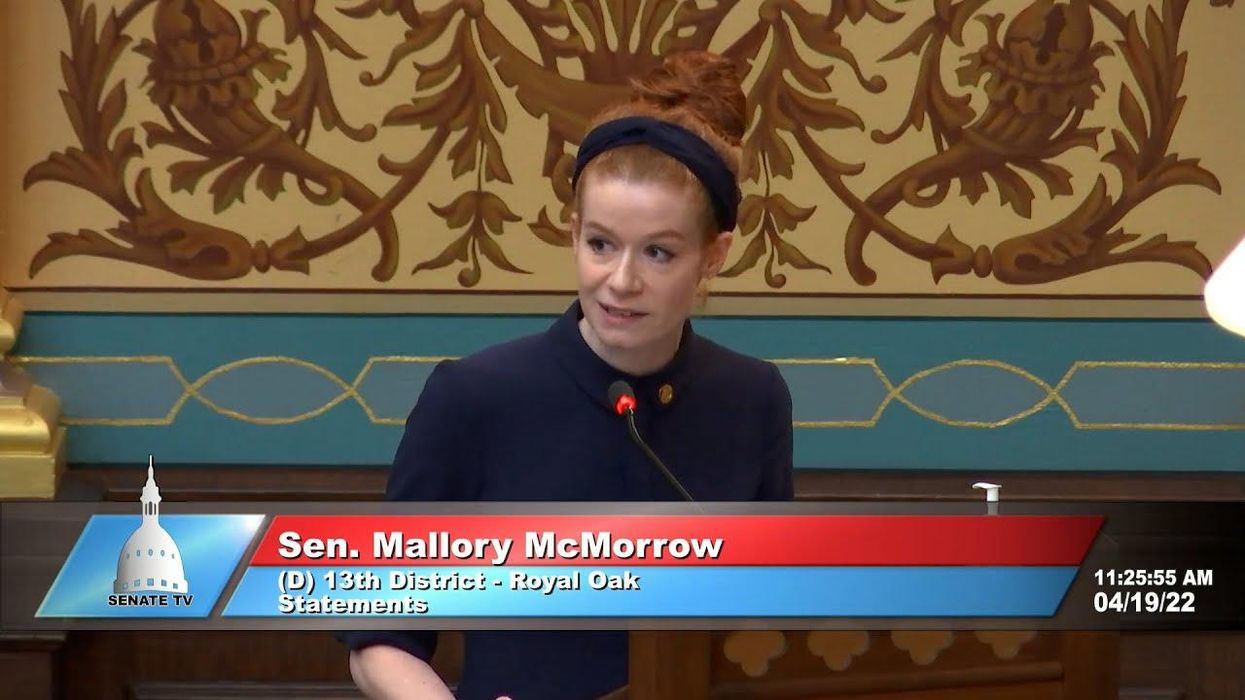Goldstone’s most recent book is "On Account of Race: The Supreme Court, White Supremacy, and the Ravaging of African American Voting Rights."
On April 19, Michigan state Sen. Mallory McMorrow took the chamber floor to deliver a fiery 5-minute speech in which she was forced to proclaim her status as a “straight, white, Christian, married, suburban mom” to deter charges by a fellow legislator, Lana Theis, that she is a closet pedophile and to defend her support of equal rights.
Theis had accused McMorrow of advocating “grooming” and said she “wants children to believe they were responsible for slavery and to feel bad about themselves because they’re white.” McMorrow called the statements ridiculous and she cited her upbringing, in which, among other charitable acts, she volunteered at a soup kitchen on Sundays and learned the importance of protecting those who could not protect themselves. “I learned that service was far more important than performative nonsense like being seen in the same pew every Sunday or writing ‘Christian’ in your Twitter bio and using it as a shield to target and marginalize already-marginalized people.”
During McMorrow’s speech, Theis literally turned her back and refused to look at the woman she had slandered. Many denounced the attack on McMorrow, which Theis had used in a solicitation for campaign contributions, as a new low. If true, it was not a new low by much.
That rhetoric on both sides of the ideological divide is getting more shrill, more hateful and, yes, more absurd is undeniable. To dismiss such talk as “just smoke,” as Steve Bannon characterized Donald Trump’s fulminating, is to both miss the point and ignore the risk. In fact, rhetoric from what, in simpler times, was referred to as the “lunatic fringe” has been remarkably successful as a means to both acquire and retain power in government. Not only do outrageous statements play into the deep anger and mistrust that so many Americans feel for those who disagree with them, but they also guarantee that the speaker, rather than being ignored, will have a wide audience and be featured in news media. Not even the wildest of conspiracy theories are dismissed now. News organizations have once more learned, or have come to grudgingly accept, that negativity — the splashier the better — sells a good more effectively than reason or quiet commentary.
Rather than providing needed competition and broadening the range of choices, the proliferation of “news” sites and social media has made the situation worse by intensifying the competition for advertising dollars and subscription fees and thereby compelling even supposedly sober-minded news outlets to both pick sides and to become more “entertaining.” With rare exceptions, those that do not are doomed to irrelevancy or dissolution.
Americans have decried Vladimir Putin’s state-controlled media for feeding the Russian people a series of lies and distortions. American media might not be state controlled, but it is hardly free of lies and distortions. The difference is that both American politicians and American media freely choose both their focus and the content of their message rather than being compelled to air what they are told to at the risk of their jobs, their liberty and sometimes their lives. In choosing restraint, American politicians and media outlets only risk ratings, relevance and recompense — which seems sufficient to dissuade them from doing so.
With tabloid journalism and ego-driven social media now the rule, outlandish pronouncements and conspiracy-theory-based politics has become self-perpetuating. The more an audience sees only one point of view, the more hardened their opinions become and the more determined they are to avoid alternatives. And so, while “Democrats eat babies” or “Even white people born in 2005 are responsible for slavery” might have been laughed off even a generation ago, no one is laughing now.
Americans are not unaware of the erosion of honorable politics and quality journalism — it has become a widely discussed topic on news outlets and social media. The problem is that each side claims purity for itself and restricts its condemnation to the other. Whatever their differences in policy, however, the politicians, the social media influencers and the journalists on either side have one thing in common.
They only keep doing it because it works.
Tucker Carlson and Rachel Maddow each earn in excess of $25 million per year, while Shepard Smith, a highly paid anchor who left Fox News for CNBC to practice more conscientious journalism, now makes less than a third of that and his highly promoted prime time show has failed to attract an audience. Other middle-of-the-road journalists surely earn far less. The rabble-rousers make more because they attract a larger audience, and a larger audience means more money for the parent company.
And so, the chief blame for the deterioration of civil discourse and healthy political debates cannot be assigned to self-aggrandizing individuals or greedy corporations. It lies with us.
Democracy is an unforgiving system. If you stay home, other people get to make the rules; if you do not choose your leaders wisely, you are stuck with decisions that may well not be in either your best interests or those of the society in which you live. If you opt to be uninformed or restrict your intake to whoever screams the loudest while telling you what you want to hear, you lose the right to complain when you decide you were betrayed, misled or lied to.
Politicians and media purveyors may have abdicated their responsibility to transmit information in a manner that is in the best interest of the nation, but their audiences have abdicated their responsibility to force them to do it. If that does not change, it is difficult to see how the nation will be able to effectively govern itself in a world where ineffectiveness carries an increasingly steep price.



















 Senate Committee on Commerce, Science, and Transportation ranking member Sen. Maria Cantwell (D-WA) (R) questions witnesses during a hearing in the Russell Senate Office Building on Capitol Hill on February 10, 2026 in Washington, DC. The hearing explored the proposed $3.5 billion acquisition of Tegna Inc. by Nexstar Media Group, which would create the largest regional TV station operator in the United States. (Photo by Chip Somodevilla/Getty Images)
Senate Committee on Commerce, Science, and Transportation ranking member Sen. Maria Cantwell (D-WA) (R) questions witnesses during a hearing in the Russell Senate Office Building on Capitol Hill on February 10, 2026 in Washington, DC. The hearing explored the proposed $3.5 billion acquisition of Tegna Inc. by Nexstar Media Group, which would create the largest regional TV station operator in the United States. (Photo by Chip Somodevilla/Getty Images)
